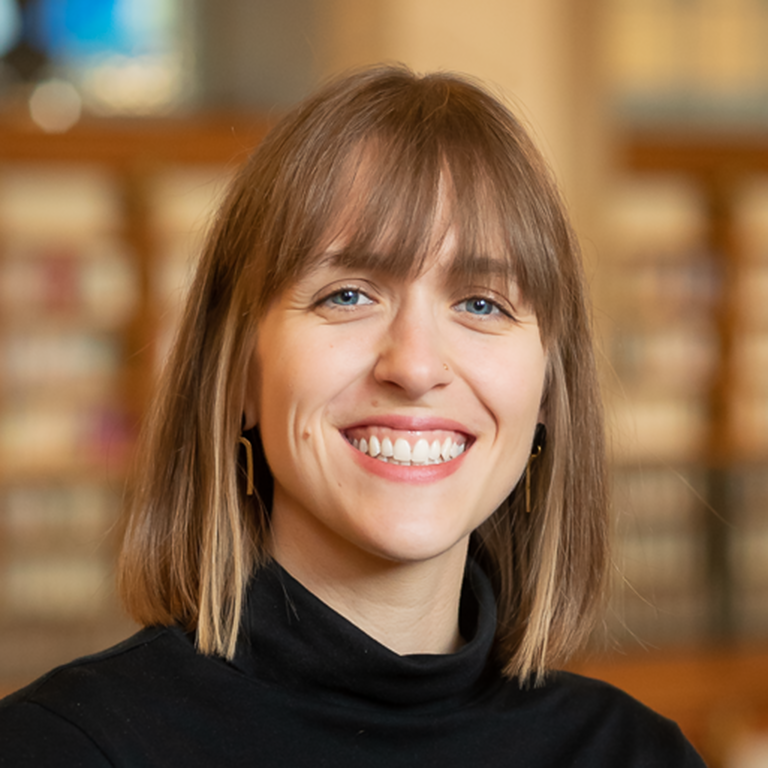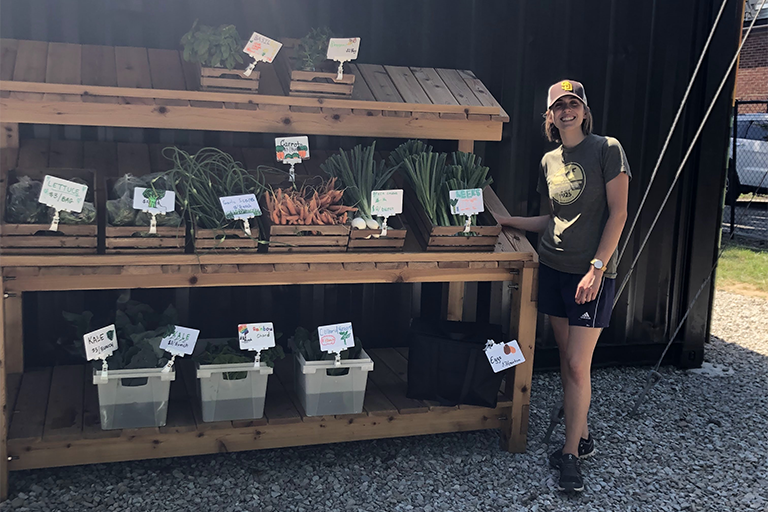ThisQ&A serieshighlights McKinney Climate Fellows alumni and their professional journeys within Indiana and beyond. TheMcKinney Climate Fellows program, administered by Indiana University’s Environmental Resilience Institute and Integrated Program in the Environment, connects IU undergraduate and graduate students interested in climate, sustainability, and community resilience with career experiences.
A South Bend native, Katherine Couch didn’t hear much about global warming and its effects until she was a college undergraduate. As her knowledge about climate change grew, so did her desire to be part of positive change on behalf of her community and the planet.
As a graduate student at IU South Bend, Couch immersed herself in sustainability and climate work, serving as a McKinney Climate Fellow with the Patachou Foundation in 2022, working with the Town of Zionsville on multiple sustainability initiatives during the 2022-23 school year, and conducting outreach on behalf of the City of South Bend as a climate action ambassador in 2023.
After graduating from IU South Bend with a master of liberal studies degree with a focus on sustainability studies, Couch joined Hamilton County Tourism as its senior sustainability manager.
The following interview has been lightly edited for length and clarity.
What major projects did you work on during your McKinney Climate Fellows placements?
With the Patachou Foundation, I was doing a lot of the day-to-day and logistics of their food fellowship, which is a job training program for low-income and minority students in inner city Indianapolis. If you build job skills and capacity, it can help people provide for themselves in the future. I enjoyed that program. I have a background in teaching, and I got to use a lot of my interpersonal skills. I could see how I was working on a systemic, societal issue of food insecurity and equity issues.
With Zionsville, my main focus was on research, planning, and applying to get a compost permit for a new municipal compost site that they were working on. My job was to look at two different parcels being considered for the site and coordinate between different stakeholders to decide which one it was going to be. I did a lot of background research on equipment and how to run a site. A big part in the spring was filling out and submitting the application to the Indiana Department of Environmental Management, so they could approve the site.
What did you learn as a McKinney Climate Fellow and how did it inform your career path?
I think what was really cool about the climate fellows program was that I just learned so much about who’s doing what in Indiana and nationally. It made me feel like I had access to people and resources to potentially make action happen in my area in Indiana. The teachers and mentors in that space also taught me to think about your audience and reframe climate action in terms that are most relatable. We can frame our action around flooding, about extreme heat, public health, the quality of our cities, and our quality of life. I really enjoy that perspective because I think it’s the way to find common ground and collective action. Afterall, we all have the same goal of good quality of life going into the future.
What called you to pursue a career focused on climate and sustainability and why did you decide to work in Indiana?
I grew up in a pretty conservative background and climate change and global warming were not something that my community was thinking about. I didn’t really hear about global warming and climate change until I went to college. At that point, I wondered how have I not known that my actions and the whole way my community and our society are set up is causing these global issues? I started doing more personal sustainability, like buying used and cutting down on plastic.
Over the years, I realized we really need a societal shift, and I wanted to be part of that. I realized I needed to know a ton more and decided to go back to school. I wanted my job to be the work that I really care about and see as essential for our continued existence. Sustainability is constantly interesting. There’s so much to learn to the point where it can be a little overwhelming. But I love to learn, and I know this is all worth learning.
I decided to stay in Indiana because this is my home. Whether it’s the most glamorous or exciting place in the world doesn’t really matter to me. It’s the place that I’ve lived and grown up in, and it means a lot to me. My meaningful childhood and adult existence here have been supported by extensive use and abuse of our natural environment. We’re starting to see, in very tangible ways, that public health is absolutely reliant upon environmental health. So, if we don’t take environmental health into account, then the people that we know and love in these areas are the people that are suffering. It's not the people far away, it’s us.




